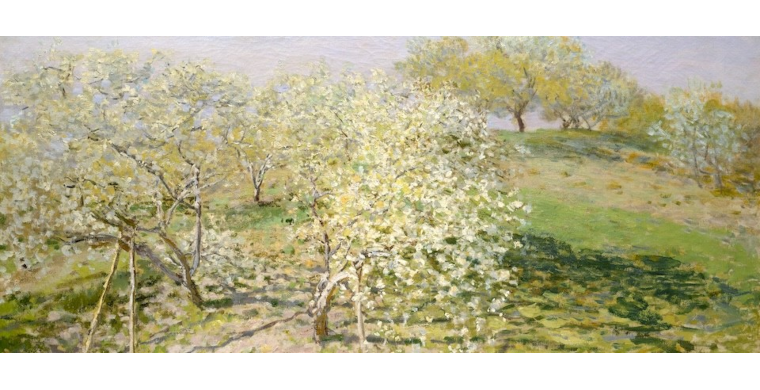RESTORING SEXUAL SANITY
by Peter J. Leithart
FIRST THINGS
7. 19. 24
Ours is an age of sexual insanity. Men compete in women's sports, male nurses share dressing rooms with female nurses, and anyone who objects is a bigot. Drag queens are children's entertainers, and cops watch nude men and women stroll along the streets of San Francisco celebrating Pride Month. The leaders of America's "pro-life" party can't be bothered to speak out against killing unborn children, or risk upsetting party members in same-sex relationships by defending marriage. When a massive report finds that "gender affirming care" does more harm than good, American doctors blithely carry on, with the full support of the current administration. Our sexual ethic reduces to a single prohibition: Thou shalt not suppress any sexual desire.
How can we free ourselves from the morass? An ancient love poem, I submit, points the way. At the center of the Song of Songs is a garden scene: Bridegroom and Bride rejoice in one another (SoS 4:16--5:1) in an erotic Eden, which rekindles the sexual bliss of a new Adam and a new Eve, fired by the unquenchable flame of Yahweh's love.
What is restored? The form of the Song answers the question. It's a polyphonic poem, interleaving the voices of male and female, whose halting dance of mutual desire is cheered on by a chorus. To the consternation of some conservative readers, the Bride initiates the duet, longing for the Bridegroom's inebriating kisses, intoxicated by his fragrance, hoping to escape to a chamber where they can drink together the wine of love. The Lover responds with praise of her eyes, her body, her beauty. They swirl around each other until the poem's central stanzas, where their desires are fulfilled in an erotic banquet where each is both host(ess) and fare. What's restored is a sexual purity that burns white-hot, a purity as far from prudery as one can get. Each receives, each gives; each is consuming, each is consumed. For Solomon, something like erotic delirium, charged by the current of mutual passion, is the pinnacle of sexual rationality.
We may put the point more abstractly. As the Spanish philosopher Julian Marias writes, as male and female "man is realized disjunctively," rather than in division or mere difference. "I can divide white and black balls into two different piles; this division separates the balls and makes them independent of each other; white balls on one side, black ones on the other, and no more: in the white balls there is no blackness or suggestion of blackness, in the black ones there is no element of whiteness." That's not how man and woman differ. Far from dividing or separating, sexual disjunction "links": "The disjunction between man or woman affects both man and woman, establishing a relationship of polarity between them. Each sex co-implicates the other, which is reflected in the biographical fact that each 'complicates' the 'other.'"
We have it on the highest authority that solitude isn't good for either men or women. In the erotic Eden of the Song, woman becomes herself by virtue of her magnetic attraction to the man, while the man is man as he bends in desire toward his bride. Man and woman are restored to themselves only as each knows himself or herself through the other. As Marias puts it, men and women both are "referred to the opposite sex," so that we know ourselves "'from' each one of us rather than 'in' ourselves." We "cannot understand the reality 'woman' without co-implicating the reality 'man,' and vice versa." As my Theopolis colleague Alastair Roberts says, male and female form a polarity analogous to the polarity of the human body. Humanity has two sexes as a body has two eyes, two ears, two hands. Eyes cannot focus when each goes its own way; nothing gets done when the right hand works at cross purposes with the left hands. When the two are restored to their proper polarity and harmony, man can see, hear, and act. The Song's erotic Eden portrays a humanity no longer disabled.
But the Song isn't just a love song. As Jews and Christians have recognized for millennia, the Bridegroom isn't any old lover, but the Lover, Yahweh. The Bride isn't a generic beloved, but the Beloved Bride of Christ. The first Eden wasn't first of all a bower of bliss but the first sanctuary, the forested, well-watered glade later replicated in the tabernacle, temple, and new Jerusalem. The erotic Eden of the Song is also a liturgical Eden, where the Creator communes with man in the original marriage whose icon is the disjunctive union of male and female.
When we read the Song as simultaneously love poem and allegory, it points the way to sanity. The two Edens of the poem are inseparable. We want the erotic Eden where men are men, women are women, and men and women incline toward and cling to one another in joyful expectation of children. But we can't reach past the liturgical Eden to seize the erotic Eden. The liturgy enacts the archetypal reciprocity and bi-polarity of Bridegroom and Bride. The path to sexual sanity passes through the liturgical dialogue of Christ Jesus and his church, which alone restores our broken sexuality and models the polyphonic love for which God created us in his image as male and female.
Peter J. Leithart is president of Theopolis Institute














